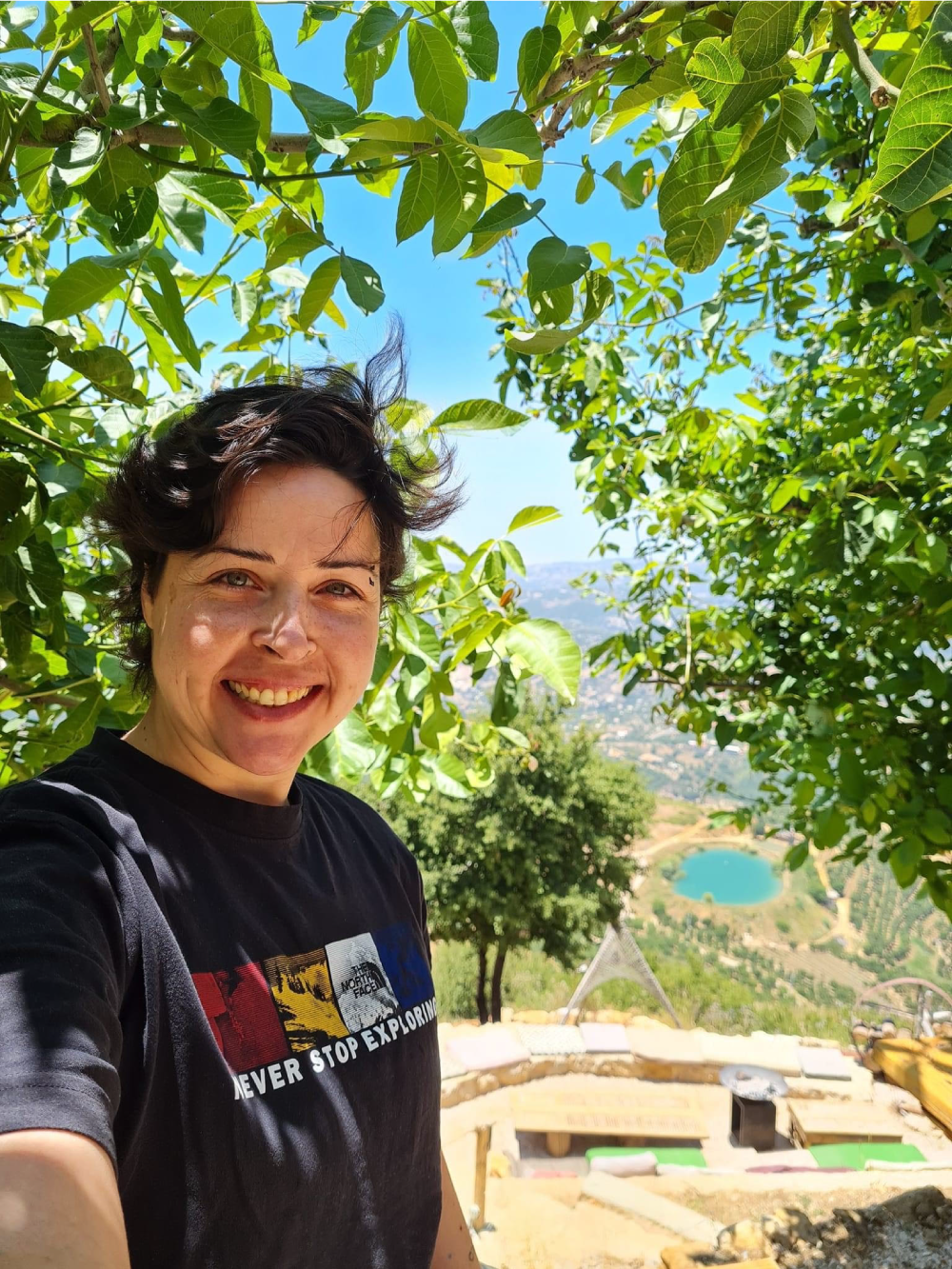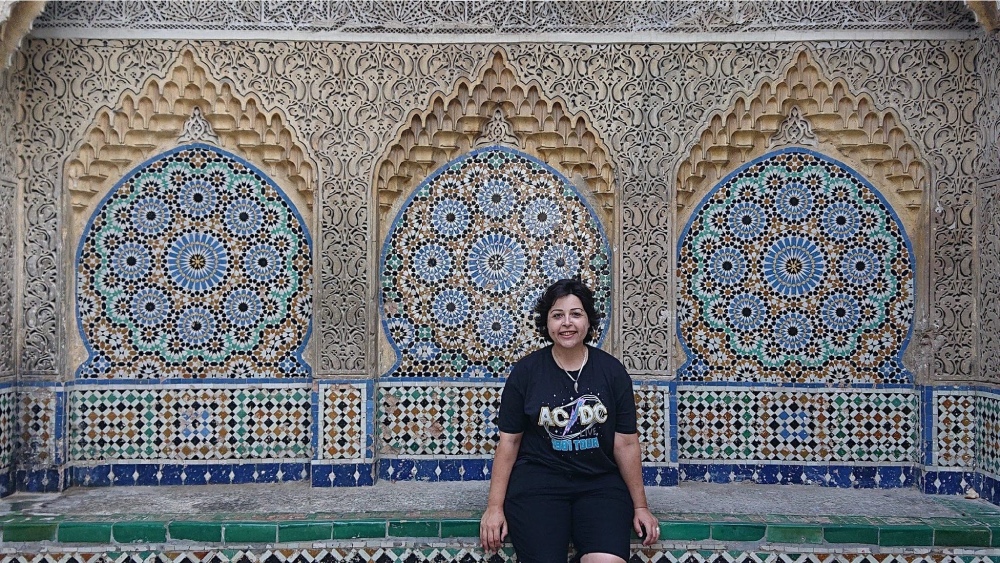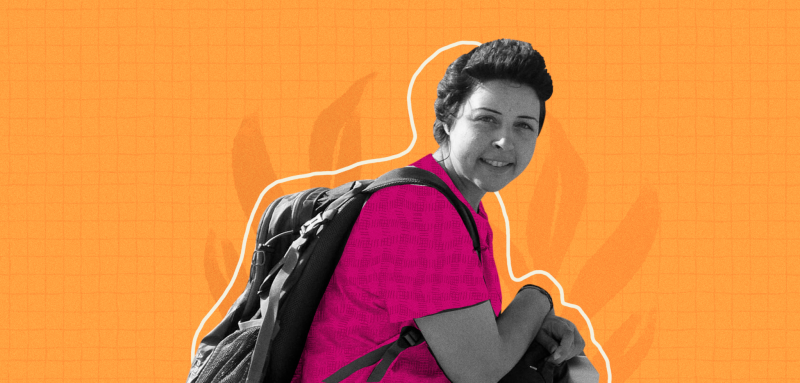Colored Stories: A dedicated space for vibrant stories belonging to individuals within the LGBTQIA+ community. These are stories of people who have overcome great challenges, shattered taboos, and left a strong mark in the public sphere or in the professional path they chose. Through their perseverance and effort, they have proven that success is not limited to sexual and gender identity, and that dreams are accessible to everyone without exception.
"Life is full of challenges, and we need time to overcome them, but they all shape a person's character and give them the strength to continue. We are here, we exist, and we will persevere until we reach our goals and realize our dreams." Her words resonate like an earthquake within the LGBTQIA+ community, yet Syrian activist Amira Al-Tabbaa says them with a gentle voice, a soft smile, and eyes filled with hope as she organizes her thoughts and some papers on her desk, as if gathering herself for a new confrontation.
In the difficult circumstances faced by Syrian LGBTQIA+ individuals, at home and abroad, certain names emerge as beacons of hope, providing confidence and helping the suffering and the most vulnerable groups in society.
One of the most renowned LGBTQIA+ activists in the Arab World
Every day, many messages filled with questions and inquiries flood her virtual space. She responds to some, investigates and searches for answers and solutions for others, and uses her network to provide help in every possible way, without being restricted by specific hours.
Her name is almost always mentioned in conversations among members of the Syrian LGBTQIA+ community, as a person who helps vulnerable groups in society and a reliable source of information. Amira is one of the most renowned LGBTQIA+ activists in the Arab world. This young Damascene woman, who still carries the spirit and memories of the city with her, divides her time between her work in translation and administrative consulting and her passion for social work and helping vulnerable groups in society. Her years of learning and work have granted her expertise in protection programs, providing psychological support, and working to stop violence.
"Life is full of challenges, and we need time to overcome them, but they all shape a person's character and give them the strength to continue. We are here, we exist, and we will persevere until we reach our goals and realize our dreams."
"There certainly is hope and there is a better tomorrow," Amira confidently tells Raseef22. Despite living and working in a region ravaged by wars and crises, she is determined to continue her work, which she insists on calling a "struggle," linking it to the idea of freedom, liberation and achieving justice, the rule of law, and freedoms.
Amira practices sports regularly and is skilled in some martial arts. "I know how to defend myself and I fear nothing. Those who do good and do not harm others have nothing to fear. Therefore, I have turned all the harm I faced into strength that encourages me to continue my activism to help others."
A long journey and a persistent effort
Amira has traveled to many countries and worked in various fields, from administration to translation. Those who know her describe her as a piece of qishani (a traditional Damascene art of colorful glazed ceramics), as her life has been composed of interconnected, colorful pieces. She is a daughter of a distinguished family and an educated woman who rebelled against societal norms and stereotypes. She is an interwoven fabric resembling a mosaic that combines elegance and the charisma of a strong, rebellious personality, along with kindness and approachability. This has given her the ability to communicate and build relationships easily, enabling her to express her ideas with clarity, spontaneity, and sincerity. "I strive to achieve my goals in a logical way, aligning the reality of society with the needs of its vulnerable groups, empowering them, and granting them their full rights and freedoms," she says.
Amira discovered her sexual orientation during her teenage years. The virtual world and her proficiency in other languages helped her explore herself and understand who she is and what she wants. "I always had an inner feeling that I was different, but when I joined some dating and chat sites, I began to understand myself and what I wanted more clearly."
 Syrian activist Amira Al Tabbaa
Syrian activist Amira Al Tabbaa
It's very difficult for an individual to live in societies and countries that suppress social awareness, sexual orientation, and do not respect human diversity.
Before coming out, Amira had a strong relationship with her family. She describes the atmosphere in her home as "filled with joy and laughter," but it turned tense at times due to her rebellion against marriage and later revelation about her sexual orientation. The reactions of her family members varied, leading to changing relationship dynamics, "My grandmother and many on my mother's side respect my differences and knew that I am a kind person who does no harm. They see my difference as natural and a personal freedom they do not infringe upon, since they are respectful, educated, and loving," she says. However, other relatives have severed ties with her for years, due to what she believes is their lack of understanding about personal freedom and respect for differences. "Some have shown hatred or hostility towards me, but with time, that may change."
The concept of a chosen family of close friends is common in the LGBTQIA+ community, Amira notes. "Friends and loved ones are a crucial support system in our lives, and for LGBTQIA+ individuals, they often serve as the pillars we lean on." She adds, "They love us just as we are, embracing our differences. If they accept us, they become our first refuge, a warm embrace, and a source of energy to face anything."
Amira believes that LGBTQIA+ individuals have the right to form families, provided the right conditions exist between the two partners, as well as in the surrounding society and its protective laws. She emphasizes that it is very difficult for an individual to live in societies and countries that suppress social awareness and sexual orientation, and do not respect human diversity. "We must always listen to others, allow space for thinking and developing awareness. This is how we can manage differences among people while respecting everyone's rights and without harming anyone."
Amira advocates for a social contract that accommodates everyone, accepts different individuals, and protects rights. Effective and constructive communication with the community and society is essential for a healthy life and a sound society. "The struggle of the LGBTQIA+ community is part of the larger battles in the region toward establishing a state of law that protects rights and freedoms," she says, stressing that the LGBTQIA+ community needs to play its role in public life and see itself in public spaces. "This is fundamental and necessary for us to be able to move forward. It's a long journey that we can achieve by preparing ourselves and our society, through patience, hope, knowledge, and confronting hatred and homophobia with sophistication, kindness, and knowledge."
"I know how to defend myself and I fear nothing. Those who do good and do not harm others have nothing to fear. Therefore, I have turned all the harm I faced into strength that encourages me to continue my activism to help others."
Supporting the LGBTQIA+ community
"We must not forget LGBTQIA+ individuals throughout the year and only remember or mention them during Pride Month. They need continuous attention to their issues and problems, which is a responsibility that falls on all active members of society, the media, and the law," says Amira.
Amira emphasizes the importance of the presence of LGBTQIA+ activists and more organizations that support these individuals, along with the support of the international community, especially in third-world countries where LGBTQIA+ individuals find themselves marginalized, persecuted, and barred from expression and active participation. "LGBTQIA+ individuals need a quota that mandates their presence and protects them in various aspects of public life, which can be achieved through international pressure and assistance from countries and organizations."
"Wars and conflicts in the region, along with declining cultural and economic levels and the massive waves of migration from the region, have led to a decline in awareness,” she adds. She cites examples like Lebanon and Tunisia, which were considered progressive in terms of LGBTQIA+ rights and legislation compared to other countries but have recently experienced persecution, restriction, and incitement.
She continues, "There are no safe areas in a country torn apart by war, divided by oppression and extremism, and plagued by chaos." Amira expresses her concern for LGBTQIA+ Syrian refugees who face racism and intense campaigns against them in several countries, including Egypt, Lebanon, Iraq, and Turkey. "I recognize Lebanon's circumstances and appreciate the support it has provided us despite its limited resources, but LGBTQIA+ individuals need protection and support. They should not be deported to areas that are still dangerous, unsafe, or unstable, as this directly threatens their lives."
Amira also highlights her concern about the delays in processing asylum applications, with some cases taking years. She criticizes countries in the Global North for their attempts at reducing the number of refugees without providing alternative solutions that ensure the safety, freedom, dignity, and basic rights of these individuals.
"Pride is in our lives"
Amira praises the political efforts of some Syrian members of the LGBTQIA+ community and the formation of entities that support queer individuals inside and outside Syria. "It is a pioneering step in the region, especially since it is driven by enthusiastic youth who possess awareness and knowledge."
"We must not forget LGBTQIA+ individuals throughout the year and only remember or mention them during Pride Month. They need continuous attention to their issues and problems, which is a responsibility that falls on all active members of society, the media, and the law"
 Syrian activist Amira Al Tabbaa
Syrian activist Amira Al Tabbaa
Amira underscores the importance of media and social networking in our lives, "They expand our knowledge, broaden our perception and culture, and lay the foundation for openness to the wider world. They have a great influence on reality and have the power to bring about substantial changes in many concepts." She explains that social media is accessible to everyone and can overcome language and distance barriers. This led to her decision to appear on the Lebanese television program "Ana Heik" (“This is me”), which marked a significant turning point in her life. "After appearing with Nishan on Ana Heik on Al Jadeed TV in 2019, I became more well-known in Syria and the Arab region."
She adds, "Such programs give members of the LGBTQIA+ community the feeling that they are not alone and that there are people fighting for their rights. Public visibility helps eliminate isolation and loneliness, fosters a sense of belonging and strength, and boosts the confidence of LGBTQIA+ individuals."
Amira constantly reminds us that "we must be proud of ourselves, always strive to secure our rights, support one another, and believe in the justice of our cause despite everything around us."
She concluded the interview, "I am proud of my survival amid all these problems, proud of my experiences and the success of my work projects, and proud of the many people I have helped who are now in better conditions." She hopes to see her country, Syria, and the wider Middle East in a better state.
Raseef22 is a not for profit entity. Our focus is on quality journalism. Every contribution to the NasRaseef membership goes directly towards journalism production. We stand independent, not accepting corporate sponsorships, sponsored content or political funding.
Support our mission to keep Raseef22 available to all readers by clicking here!
Interested in writing with us? Check our pitch process here!





